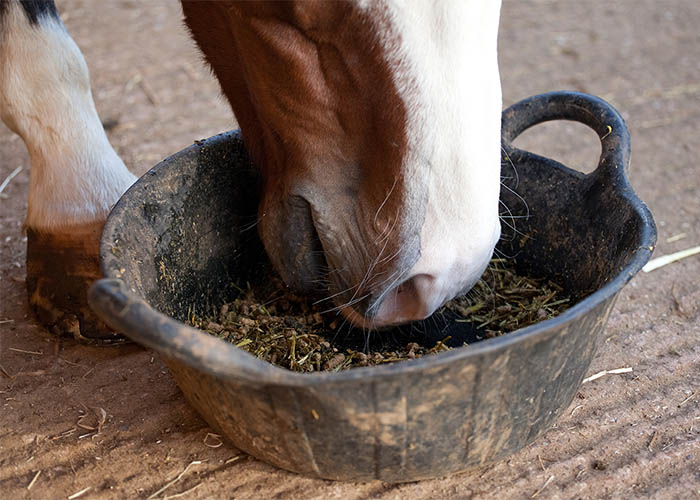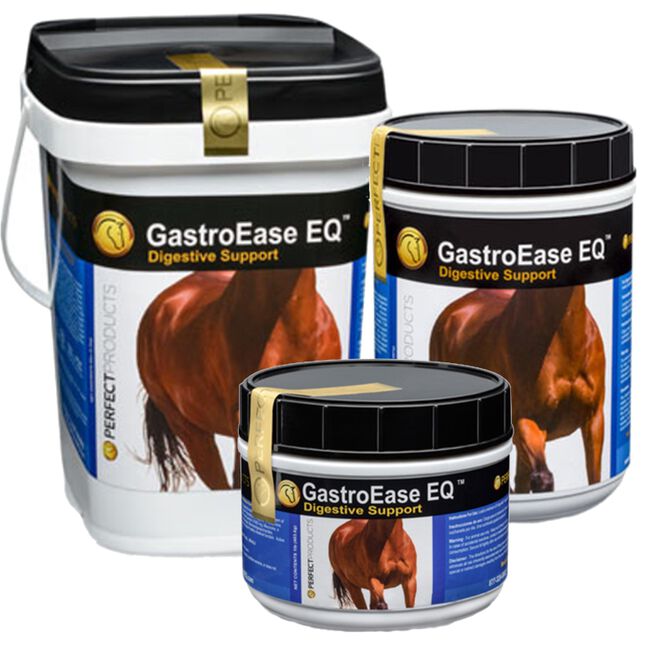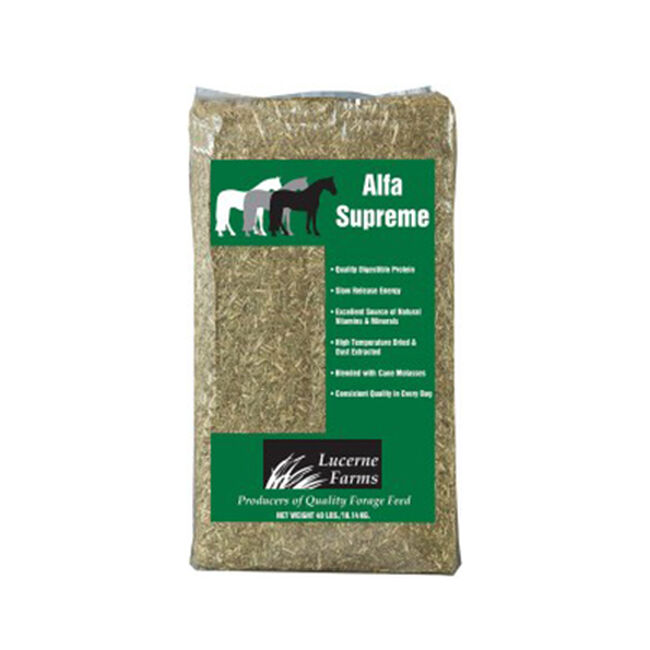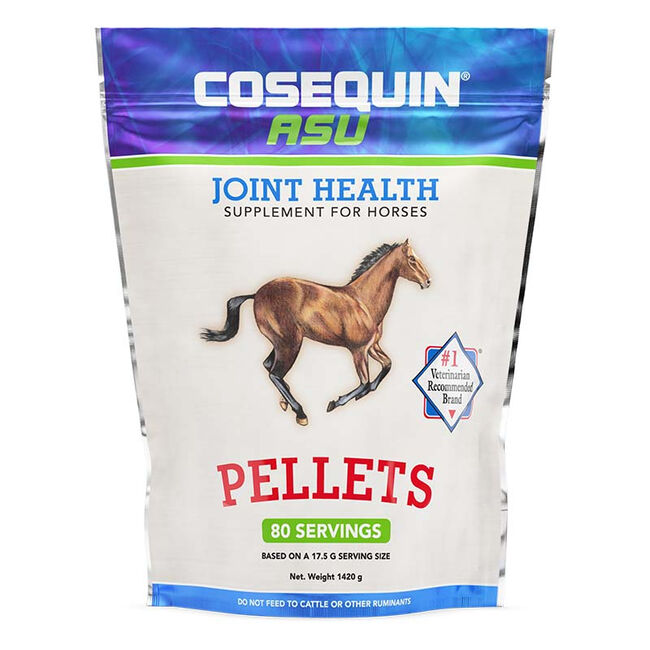
Every horse is an individual, and, just like humans, every horse has their own set of preferences and mannerisms. Some horses are extremely food-oriented, while others are a bit more discerning in their eating habits. A handful of horses, however, are downright picky. They are choosy about what they eat, when they eat, and how much they eat. These finicky horses can be difficult to keep weight on and may require some creativity at mealtime. We spoke with Denise Bean, an equine nutritionist and the owner of Exclusive Equestrian Services, LLC, in Danvers, MA, to learn more about managing horses who are selective eaters and how we can ensure they are still receiving the nutrition that they need to thrive.
How do you know if your horse is a finicky eater? “I would define a picky eater as a horse that is quite particular about the types of food he/she ingests,” Denise tells us. “However, I believe there are multiple sub-categories within that generalization.” Some horses are picky about the food that they eat, while others are particular about the location where their food is served, and some horses are choosy about the textures or food combinations that you provide them. Additionally, some horses may become picky eaters when their environment changes, such as at a competition or when traveling in a trailer.
“Examples of choosy eaters include horses that eat their grain, but not their hay, or vice versa; horses that will not eat hay on the trailer; horses that become poor drinkers at competitions; horses that will not eat wet feed; horses that will not eat grain once a supplement or medication has been added to it; horses that will only eat off of the ground; horses that will only eat out if a feeder; and horses that will eat a certain product for a while before they decide they no longer like it,” Denise explains. “I feel it is also important to mention that a picky eater may be a horse that is finicky about all of the foodstuffs in their diet, or it may be a horse that is only careful about some of the foods in their diet, such as forage. It may be a horse that is only hard to please with respect to concentrates (grain), or it may be a horse that may be difficult about supplements and/or medications.”
When talking about these horses, it is important to realize that it is an issue that needs to be addressed as soon as possible, “Some concerns that I have with a picky eater are maintaining proper body weight, preventing dehydration, upholding energy levels, support for the overall immune system, as well as keeping up the function of various systems within the horse that sustain the body, such as organs, coat, and hooves,” Denise explains.
It is important to consider multiple factors when trying to manage a finicky eater. “You may need to think outside of the box, consider the whole horse’s lifestyle,” she continues. “It may very well be a medical reason, a hereditary deformity (such as parrot mouth), an environmental stressor, or a living arrangement. If the horse is in a herd, you may need to separate the horse at feeding time so they feel safe and are actually able to eat at mealtime, without being dominated by others.” If your horse suddenly becomes a picky eater, there are additional considerations. It is important to rule out possible physical ailments, such as dental health issues, digestive concerns, organ disease, the presence of ulcers, infection, or pain within the body. An uptick in your horse’s stress level may also cause them to become pickier about the foodstuffs that they consume. Addressing these issues is important as you try to entice your horse to eat more.
Ulcers tend to be a common reason why horses suddenly go “off” their feed or have been finicky for a while. If you suspect that your horse is suffering from ulcers, you will want to speak with a veterinarian so that they can confirm the diagnosis. Horses who are susceptible to ulcers may benefit from a digestive supplement to keep their digestive tract functioning at an optimal level. There are a number of products on the market to support digestive health, including Perfect Products GastroEase EQ, Succeed, and Finish Line U-7 Gastric Formula.
Perfect Products GastroEase EQ
This powder supplement supports your horse’s gastric lining with a proprietary blend of ingredients.
When you are presented with a horse that is a finicky eater, realize that it may take time to find a resolution. “You can encourage a picky eater to eat more by ensuring the feeding environment is fresh and sanitized. Check all buckets and feeders for cleanliness, while also checking the actual feedstuffs for any sort of contamination, such as rancid ingredients, deceased varmints, and mold,” Denise says.
After you have made sure that your horse’s feeding utensils are clean and fresh, it is time to take a look at what you are feeding your horse. It may take a bit of persistence on your part, but serve your horse small quantities of diverse concentrate or forage options to determine what appeals to them. Some horse owners find that combining several grain products together encourages their horse to eat (please make sure to read the labels to make sure that your horse is receiving adequate amounts of protein, carbohydrates, vitamins, and minerals if you choose to go this route). If your horse is on the thin side, it may be helpful to feed a product that offers a higher caloric value or is easy to digest, such as a product designed for a competition horse or a senior horse, an alfalfa forage, such as Lucerne Farms Alfa Supreme, or a healthy fat (oil or weight gain supplement).
Lucerne Farms Supreme Alfalfa Dengie
This alfalfa forage is an excellent source of naturally occurring vitamins and minerals.
You may also try to add enticing, healthy treats, such as fresh fruit (like apples, grapes, watermelon, and bananas) and fresh vegetables (such as celery, corn, turnips, and carrots). It is important that you educate yourself on inappropriate, unhealthy or toxic fruits, vegetables, and plants (for example tomatoes, onions, avocado, or rhubarb) before adding anything to the feed. “You may also try including healthy spices, such as cinnamon; fruit juices, like 100% apple juice; or natural sweeteners, such as honey, maple syrup, or baby food,” Denise adds. You can also try adding water to the various feedstuffs; some horses prefer a wet, mash type, consistency, which also increases the horse’s water consumption.
Denise encourages horse owners to also look at how they present the food to your horse, “Regarding concentrates, you may want to adapt to feeding smaller meals, more frequently, or perhaps in a different manner. For example, rather than a traditional bucket that is hung, try a ground feeder or even a horse toy that will dispense the grain. With respect to forages, you may try a different delivery system, such as a slow feeder hay net, such as the NibbleNet, or a hay rack.”
For some horses, supplements and medications top-dressed on feed may be what causes them to become especially reluctant to eat their meals. There are a number of ways to address this. The most simple solution is to use a sweetener (honey or molasses), fruit juice, bran mash, like the Emerald Valley Speedi-Beet, or sweet feed to encourage consumption. You may also find that your horse prefers pelleted supplements over powdered supplements. If this is the case, there are a number of pelleted formulations available for many popular supplements, including Cosequin ASU Pellets, Uckele G.U.T. Pellets, and Farnam Apple Elite Electrolyte Pellets.
Cosequin ASU Pellets
The customer favorite Cosequin ASU joint health supplement is now available in a tasty, easy-to-feed pelleted form.
However, switching up your horse’s supplements is not always enough. “Another option may be to simply mix the supplements or medication with a liquid, juice, or sauce and syringe it into your horse’s mouth,” Denise explains. “When equestrians utilize this option, I recommend doing it before or after a grooming session so that it is not associated with feeding time at all.” Dimples Horse Treats also contain a handy pocket that can make it easy to administer pills.
When it comes to managing a finicky eater, sometimes it requires some out-of-the-box thinking. It is also important to realize that they may not develop a voracious appetite overnight. But, with a bit of trial and error, you can ensure that your horse is eating enough to meet their nutritional requirements.
At The Cheshire Horse, we are here to help! Our friendly and highly trained sales staff have a wealth of experience with horses. We invite you to reach out to us if you have any questions about your horse’s nutritional needs or would like to schedule a complimentary equine nutrition consultation. Horse owners ourselves, we are always happy to bounce ideas off of you and discuss what has worked for our personal horses in the past.



